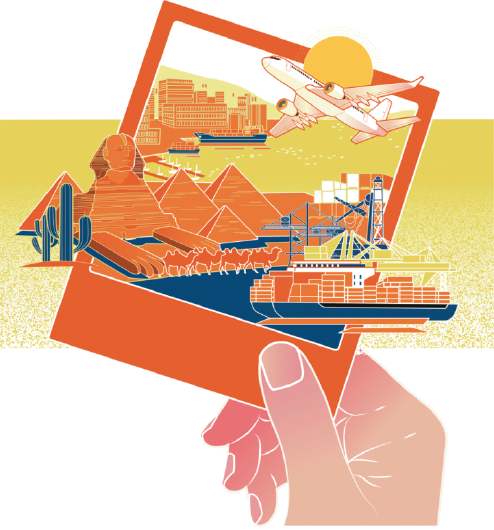
[Photo by Shi Yu/China Daily]
By Ahmed Bahaa El-Din Shaaban
When China proposed the Belt and Road Initiative, it was supported by most of the countries and peoples of the developing world that had long suffered from isolation due to the selfish economic and political policies of the US-led imperialist powers.
These countries realized the initiative could save them from further exploitation at the hands of the imperialist powers and prevent the plunder and pillage of their resources by foreign forces. They did so because they believe in China's vision of an equitable and fairer world order, its sincerity in facilitating overall human progress and its spirit of sharing in order to build a prosperous future for all.
In a speech delivered at Nazarbayev University in Astana, Kazakhstan, on Sept 7, 2013, President Xi Jinping, while explaining the vision of the Belt and Road Initiative, said that throughout the millennia, the peoples of various countries along the ancient Silk Road have written a chapter of friendship that has been passed on to this very day. He also said that more than 2,000 years of exchanges demonstrate that on the basis of unity, mutual trust, equality, inclusiveness, mutual learning and mutually beneficial cooperation, countries of different races, beliefs and cultural backgrounds are fully able to share peace and development. This is the valuable inspiration we have drawn from the ancient Silk Road.
The Belt and Road Initiative is a global development project that transcends national borders and continents, as well as natural and man-made barriers. Its aim is to strengthen economic cooperation among the countries involved, and promote cultural exchanges among them, and better connect countries so everyone could benefit from the initiative. But huge financial and logistical investments are required to make this global development project a success.
In his speech, President Xi, while making clear some of the prospects of the Belt and Road Initiative in enhancing and smoothening trade flow, stressed that the envisaged economic belt along the Silk Road is inhabited by nearly 3 billion people and it represents the biggest market in the world, with enormous, unparalleled potential for trade and investment cooperation between the countries involved.
He said that friendship between people is the key to good relations between states, and that to pursue productive cooperation in the above-mentioned areas, we need the support of the peoples. He also said that we should encourage more friendly exchanges between our people to enhance mutual understanding and traditional friendship and build strong public support and a solid social foundation for regional cooperation.
According to the plan, we can say that for the smooth progress of the initiative, the Arab region, with Egypt at the center, is one of the most critical regions in the world. Yet the active participation of the Arab countries in the Belt and Road projects will be directly related to the success of the initiative.
First, the Arab countries are an important part of the ancient Silk Road. The economic and cultural (civilizational) exchanges between China and the Arab countries go back to ancient times. In fact, an ancient Arabic proverb says, "Seek knowledge even if you have to go as far as China." Despite the physical distance between China and the Arab region, China's high civilizational status was well known in the Arab region even in ancient times.
Second, the Arab region occupies a unique and important stretch of the Belt and Road Initiative's target path including important sea routes and lanes, and bays such as the Strait of Hormuz, the Strait of Bab el-Mandeb and the Suez Canal. The Arab region is also rich in natural resources such as oil, gas, clean energy and minerals, which is an important factor prompting the Arab countries, especially Egypt, to take an active part in the initiative.
Third, in order to develop their economies, modernize their infrastructure facilities, increase their production capacity, and benefit from extensive commercial, political, and logistical coordination, many Arab countries, particularly Egypt, need now more than ever to attract investment and capital from and take advantage of the strong scientific and technological capabilities of China and the other economies participating in the Belt and Road projects.
It is a felicitous coincidence that the bright prospects of the initiative are also highlighted in the ongoing 20th National Congress of the Communist Party of China.
It is worth recalling that Egypt was one of the first countries to recognize the People's Republic of China and the first Arab country to take the courageous step in defiance of the "American redline". Egypt's independent foreign policy stance prompted many other Arab countries to follow in its footsteps. And the bond of friendship and mutual respect that united Egypt's leaders of the time with their Chinese counterparts remains strong to this day.
Beijing is on road to making the Belt and Road Initiative a grand success, which will also help the country to fulfill its second centenary goal of developing China into a great modern socialist country that is prosperous, strong, democratic, culturally advanced, harmonious, and beautiful.
We are confident that future generations will enjoy the fruits of this great development initiative, whose aim is to end the era of exploitation, plunder, and political oppression of the developing world, and help build a new world of prosperity and peace.
The author is secretary-general of the Egyptian Socialist Party.

 中文
中文



